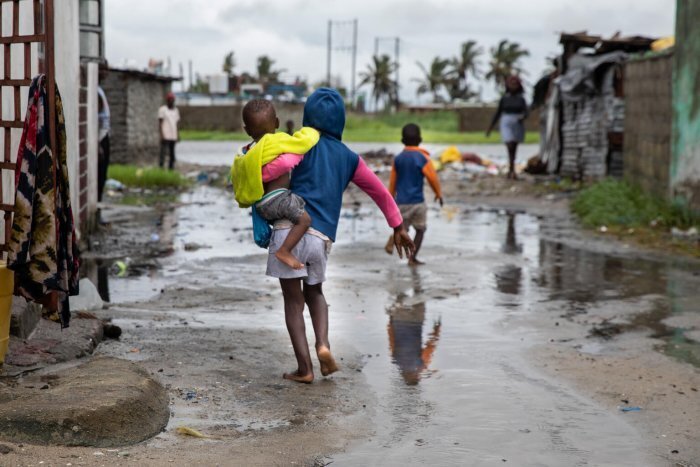
Palm Hills allocates EGP 30 m for backing Egyptian athletes
Palm Hills, Egypt’s leading real estate developer, allocated EGP 30 million for supporting Egyptian athletes under ...

UNICEF has launched its first Children’s Climate Risk Index on the third anniversary of the youth-led climate protest movements that have grown into a global movement.
UNICEF has been collaborating with Fridays For Future to amplify the voices of children and young people on the frontlines of the climate crisis, and it is why UNICEF launched the index.
UNICEF Executive Director Henrietta Fore said “Just this summer – all over the world – we are seeing evidence of just how imperiled this inheritance is. Wildfires so vast in Canada and the western United States the air quality rating all the way across the continent in New York is the worst it had been in a decade and a half. Historic flooding in Germany devastated entire towns and killed hundreds. Landslides also hit India. Heatwaves also hit in North Africa. The list goes on.”
Critically, the devastating results of climate change are not discriminating across borders. They are disrupting lives and livelihoods regardless of income, race, or region. But it is by far the poorest and most vulnerable countries that are suffering the most.
There is an inherit injustice in this. Some of the countries least responsible for the climate crisis are the ones warming fastest, and facing the most severe impacts. Hundreds of thousands of people are being pushed toward starvation in Madagascar in the wake of back-to back droughts. Cyclones and storms continue to ravage Mozambique.
“And we are also extending this injustice to the next generation – all of whom were born into a world fully aware of the consequences of inaction, yet unable to agree on measures to stop it.”
“But children are more than just victims of our inaction. Children are uniquely vulnerable to climate hazards.”
Compared to adults, children require more food and water per unit of their body weight. They are less able to survive extreme weather events, and are more susceptible to toxic chemicals, temperature changes and disease.
Climate change affects their health and their neighborhoods, the food they eat, the air they breathe, every aspect of their futures, and every aspect of the rights to which they are universally entitled.
“The young people who have joined us today can tell you that. They have experienced the impacts of climate change first-hand. They are inheriting a world increasingly unrecognizable. And they are pleading with us to do something about it.”
“The young people with us today, and millions of others around the world just like them, are demanding action. According to a recent U-Report poll we conducted online, 9 out of 10 of the 270,000 respondents in 21 countries believe it is their responsibility to tackle climate change.”
Young people deserve greater consideration from world leaders and a more meaningful seat at the table in the decisions that will define their future. Their calls should be listened to, and acted on.
“If you have not yet had a chance to read the report, let me recommend it to you. It is the result of over a year of work by dedicated colleagues at UNICEF and our partners and represents a compilation of evidence that we have generated over the last five to six years. Its stark findings validate the message we have been hearing from young people: We are in a crisis of crises, a pollution crisis, a climate crisis, a child’s rights crisis.”
According to the report, almost every child on earth is exposed to at least one climate and environmental hazard, shock or stress. Almost every single young life will have to cope with heatwaves, cyclones, air pollution, flooding or water scarcity.
A startling 850 million – approximately one-third of all children – are exposed to four or more of these stresses, creating incredibly challenging environments for children to live, play and thrive.
Globally, about 1 billion children — nearly half of the world’s children — live in countries that are at an ‘extremely high-risk’ from the impacts of climate change.
These children face a deadly combination of exposure to multiple shocks with high vulnerability resulting from a lack of essential services.
The survival of these children is at imminent threat from the impacts of climate change.
Until now, no climate index has focused solely on child climate risk in a global context. This groundbreaking report provides the first comprehensive view of children’s exposure and vulnerability, because understanding where and how children are uniquely vulnerable to this crisis is crucial in responding to it.
“By improving children’s access to essential services, such as water and sanitation, health, and education, we can significantly increase their ability to survive these climate hazards. But addressing the climate crisis requires every part of society to act,” he said.
So, in closing, UNICEF urges governments and businesses to listen to children and prioritize actions that protect them from impacts, while accelerating work to dramatically reduce greenhouse gas emissions.
Governments must also ensure environmental policies are child-sensitive. Schools need to be educating for green skills in both the first and second decade in children’s life.
Palm Hills, Egypt’s leading real estate developer, allocated EGP 30 million for supporting Egyptian athletes under ...
Extreme weather events were the primary drivers in 18 countries where over 77 million people faced ...
Over 100 SDG-aligned projects with a total investment scope of $ 50 billion have been presented during the ...


اترك تعليقا